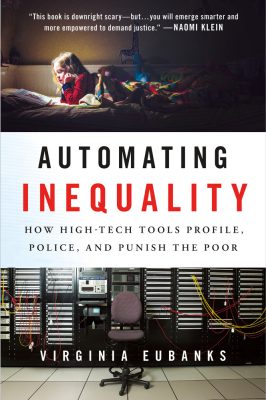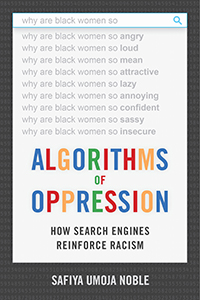Algorithms are something of a hot topic. Interest in these computational directives has taken hold in public discourse and emerged as a subject of public concern. While computer scientists were the original algorithm experts, social scientists now equally stake a claim in this space. In the past 12 months, several excellent books on the social science of algorithms have hit the shelves. Three in particular stand out: Safiya Umoja Noble’s Algorithms of Oppression, Virginia Eubanks’ Automating Inequality, and Taina Bucher’s If…Then: Algorithmic Power and Politics. Rather than a full review of each text, I offer a quick summary of what they offer together, while drawing out what makes each distinct.
I selected these texts because of what they represent: a culmination of shorter and more hastily penned contentions about automation and algorithmic governance, and an exemplary standard for critical technology studies. I review them here as a state of the field and an analytical grounding for subsequent thought.
There is no shortage of social scientists commenting on algorithms in everyday life. Twitter threads, blog posts, op-eds, and peer-review articles take on the topic with varying degrees of urgency and rigor. Algorithms of Oppression, Automating Inequality, and If…Then encapsulate these lines of thought and give them full expression in monograph form.
The books are tied together in their insistent imbrication of social, structural, and technical. Each resists technological determinism while giving careful attention to the materiality of code and its animation at the hands of user-publics. In their socio-technical analyses, each book also centralizes politics and power. This is critical. The authors weave patterns of status, power, inequality, and resistance throughout their texts. They spend time at the social margins and show with stunning clarity how personal troubles and public issues are entwined with technical systems from design to implementation. Together, these works show us what algorithms are, how they are social, and remind us that algorithmic configurations are neither natural nor inevitable, but products of value systems and political dynamics.
Noble’s Algorithms of Oppression addresses how algorithms sort and curate information. Focusing primarily on the Google search engine, Noble draws on traditional works from Library Sciences to contextual political and economic decisions about visibility, relevance, and legitimacy in information systems. Noble begins with a powerful and personal example of a Google search for “Black Girls.” Spoiler: the search returned images and links that had little to do with the interests or activities of children of color. Using this as a jumping off point, Noble traces the ways race, class and gender intersect with commercial interests and normalizing conventions in ways that perpetuate stereotypes and maintain Whiteness as the default subjectivity. “The more we can make transparent the political dimensions of technology”, says Noble, “the more we might be able to intervene in the spaces where algorithms are becoming a substitute for public policy debates over resource distribution—from mortgages to insurance to educational opportunities.”
Eubanks’ Automating Inequality takes up the very real and tangible algorithmic governance that Noble’s work highlights as significant. Eubanks draws on three case studies in which algorithms and poor Americans come in contact, with disastrous results. The book tells the story of Indiana’s welfare system, homeless services in Los Angeles, and child protective services in Pennsylvania. The work shows how poverty becomes a liability, service providers are alienated from clientele, and, like 19th century poorhouses, digital poorhouses do more to entrench economic instability than ameliorate it. With heart-wrenching accounts of lost health care, invasive data collection, and unjustly taken children, Eubanks highlights the contentious class dynamics that inform and are amplified through automated systems. “Technologies of poverty management are not neutral,” says Eubanks. “They are shaped by our nation’s fear and hatred of the poor; they in turn shape the politics and experience of poverty”. It is worth noting that this is one of the most rigorously researched books I’ve ever read. Eubanks even hires a fact-checker for herself, which sets a standard for intellectual integrity that rises beyond reproach.
Bucher’s If…Then: Algorithmic Power and Politics takes on the social side of automation. The theoretical work in the beginning of the text states in no uncertain terms that the banal platforms through which we socialize maintain deep and far reaching implications for the organization of daily life. As Bucher explains, “platforms act as performative intermediaries that participate in shaping the worlds they only purport to represent.” That is, platforms like Facebook, Twitter and Instagram are not only reflective mirrors, but powerfully efficacious in their own right. The text relies on case studies that capture social-algorithms from diverse angles. Bucher provides a technical study of the Facebook news feed, an exploratory study of everyday social media users’ “encounters” with algorithms, and documents how algorithms become institutionalized in the journalism and media landscape. Thus, Bucher tackles engineering and materiality, everyday experiences, and institutionalization of algorithmic systems, maintaining all the while a critical eye towards politics and power.
The three works are thus unified in their larger project of social scientific inquiry into algorithm studies, guided by a critical lens. Each are distinct, however, in their focus. The distinct substance of each book is a crucial reminder that algorithms are pervasive and polymorphous. They are not ends or entities in themselves, but vehicles of, and tools for, social organization in its myriad forms.
Jenny Davis is on Twitter @Jenny_L_Davis



